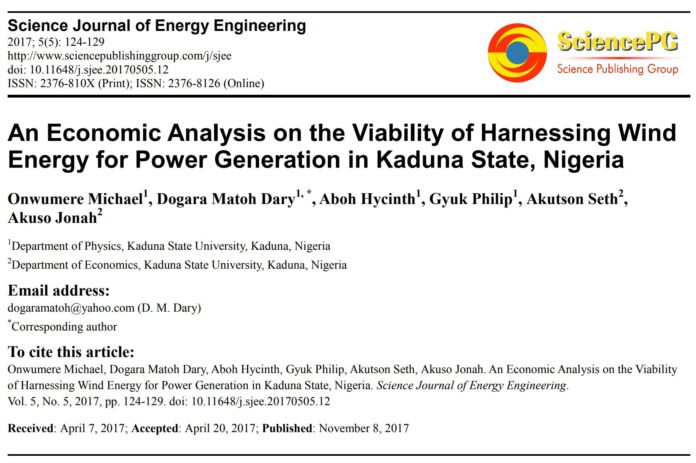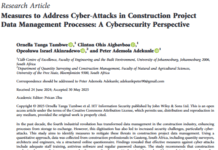December 2023: Paper of the Month by Samuel et al., 2023 – The Economic Analysis of Wind Farm Feasibility in Nigerian Defence Academy, Afaka Kaduna.
In a world grappling with the urgent need for sustainable energy solutions, the exploration of renewable resources becomes paramount. Nigeria, the most populous country in Africa, faces severe energy challenges. In the face of a global energy transition and the pressing need for sustainable power sources, researchers and policymakers are turning towards renewable energy solutions to meet growing demands. One such promising avenue is wind energy, and a groundbreaking study has delved into the economic feasibility of establishing a wind farm at the Nigerian Defence Academy (NDA), located in Afaka Kaduna. This comprehensive research explores the potential of wind energy as a viable and sustainable power source, addressing the specific needs and challenges of the Nigerian context.
In this context, a recent research paper titled “Wind Farm Feasibility in Nigerian Defence Academy” emerges as a groundbreaking study, offering insights into the economic viability of wind energy at the Nigerian Defence Academy (NDA), Afaka Kaduna. This blog post aims to delve into the key findings and implications of this research, shedding light on the potential for wind energy development in Nigeria and its broader significance for the African continent.
“
Wind farm is economically viable and can generate a net present value of 2.8 billion Naira over 20 years.– Samuel et al., 2023
How the study was conducted
The authors collected 12 years of daily wind speed data from the Nigerian Defence Academy (NDA) permanent site in Afaka, Kaduna.
Wind speed analysis: The authors used the Weibull distribution to analyze the wind speed data and calculate the wind power density and capacity factor. Wind turbine selection: The authors selected a 2.5 MW wind turbine model based on the technical and economic criteria. Economic analysis: The authors performed a cost-benefit analysis of the wind farm project, considering the capital cost, operation and maintenance cost, annual energy production, net present value, internal rate of return, and payback period.
Wind Farm Location and Design:
The study strategically selects the Nigerian Defence Academy in Afaka Kaduna as the proposed site for the wind farm, considering factors such as wind speed data, grid proximity, road accessibility, and security. The design envisions a wind farm comprised of 20 turbines, each boasting a 2.5 MW rated power, an 80-meter hub height, and a 90-meter rotor diameter. The aggregate installed capacity of the proposed wind farm is an impressive 50 MW.
Wind Speed Data and Analysis:
Central to the feasibility study is the utilization of wind speed data from the Nigerian Meteorological Agency (NIMET). The researchers employ the Weibull distribution to analyze this data, allowing them to calculate crucial metrics such as wind power density and capacity factor at various hub heights. This meticulous approach ensures a thorough understanding of the wind resource potential at the selected site.
Wind Farm Cost Estimates:
The paper goes on to estimate the total capital cost of the wind farm at $125 million. This comprehensive figure encompasses expenses related to turbines, installation, civil works, electrical works, and contingency. Operation and maintenance costs, levelized cost of energy, and the payback period are also meticulously calculated, providing a holistic economic perspective on the proposed wind farm.
Economic Viability and Comparative Analysis:
A key highlight of the research is the economic viability of the wind farm, as demonstrated through a rigorous cost-benefit analysis. The study compares the levelized cost of energy generated by the wind farm with the current electricity tariff in Nigeria, establishing its economic feasibility. The conclusion is striking: the wind farm has the potential to generate a net present value of 2.8 billion Naira over a span of 20 years.
Transferable Learning Outcomes
The significance of this research extends beyond Nigeria, offering valuable insights and learning outcomes for other African countries facing similar energy challenges. Key takeaways include the recognition of wind energy potential, guidelines for wind farm design and feasibility assessment, and insights into policy and regulation development to support renewable energy initiatives.
Challenges and Recommendations
The research does not shy away from addressing challenges hindering wind energy development in Nigeria. These include inadequate wind data, infrastructure limitations, high capital costs, policy uncertainties, and social and environmental concerns. To overcome these challenges, the paper provides insightful recommendations, ranging from improving wind resource assessment to enhancing grid integration and creating supportive policies and incentives.
In conclusion, this research represents a significant contribution to the discourse on renewable energy in Africa. By focusing on the economic feasibility of a wind farm at the Nigerian Defence Academy, the study paves the way for sustainable energy solutions in a country grappling with electricity challenges. The findings and methodologies outlined in this research offer a blueprint for other African nations seeking to harness the winds of change and transition towards a more sustainable energy future. The research concludes that wind energy is a feasible and cost-effective alternative to conventional sources of power for the Nigerian Defence Academy. The study used wind speed data from the Nigerian Meteorological Agency (NIMET) and applied the Weibull distribution to calculate the wind power density and capacity factor at different hub heights. The authors compared the levelized cost of energy from the wind farm with the current electricity tariff in Nigeria and concluded that the wind farm is economically viable and can generate a net present value of 2.8 billion Naira over 20 years.

















 The African Research (AR) Index is a comprehensive scholarly directory and database focused explicitly on journal publishers that publish and disseminate African research.
The African Research (AR) Index is a comprehensive scholarly directory and database focused explicitly on journal publishers that publish and disseminate African research.

